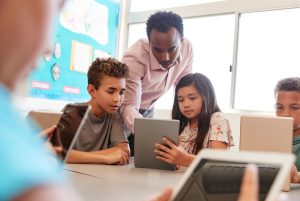
Soft Skills for Strong Teachers and Positive Schools
Course Description
The “Soft Skills for Strong Teachers” Erasmus Plus course aims to equip educators with essential “soft skills” to effectively communicate, enhance leadership abilities, and better support students in their educational journey.
This course provides participants with an interactive learning experience, enabling them to explore various tools and strategies to strengthen their teaching skills. It also fosters opportunities for experience sharing and collaboration among participants.
Course Objectives:
- Strengthening Communication Skills: Participants will work on different communication strategies, active listening techniques, and feedback methods to enhance their effective communication skills. This will aid in establishing better communication with students both inside and outside the classroom.
- Developing Leadership Skills: Participants will focus on leadership approaches, motivation strategies, and problem-solving techniques to enhance their abilities in guiding students. This will facilitate better classroom management and encourage student engagement.
- Empowering Student Support Systems: Participants will explore support strategies and methods tailored to different student profiles. This will enable the use of customized teaching methods to meet diverse student needs.
- Promoting Collaboration and Sharing: Participants will collaborate to enrich the learning environment through experience sharing and cooperation. International learning experiences will be facilitated through the exchange of cultural and pedagogical knowledge among teachers from different countries.
Learning Outcomes
- Enhanced communication skills, including effective verbal and non-verbal communication, active listening, and providing constructive feedback.
- Developed leadership abilities, such as motivating and guiding students, fostering a positive classroom environment, and promoting student engagement.
- Improved understanding of diverse student needs and the ability to implement tailored support strategies.
- Strengthened collaborative skills through sharing experiences and knowledge with educators from different cultural backgrounds.
- Increased awareness of various soft skills and their importance in the teaching profession.
- Improved classroom management techniques and the ability to address challenging situations effectively.
- Enhanced reflective practice and self-evaluation skills to continuously improve teaching approaches.
Programme of training activities day-by-day:
Day 1:
- Introduction to the course and participants
- Course objectives and expectations
- Ice-breaking activities for effective and positive interaction
- Presentation of the schools of the participants
Day 2:
- Enhanced communication skills:
- Importance of effective verbal and non-verbal communication
- Techniques for active listening
- Providing constructive feedback to students
- Interactive exercises and role-plays to practice communication skills
Day 3:
- Developed leadership abilities:
- Motivating and guiding students
- Creating a positive classroom environment
- Promoting student engagement and participation
- Group activities and discussions on effective leadership strategies
Day 4:
- Strengthened collaborative skills:
- Sharing experiences and knowledge with educators from different cultural backgrounds
- Collaborative lesson planning and implementation
- Group projects or presentations to foster collaboration
- Increased awareness of various soft skills and their importance in the teaching profession
- Improved classroom management techniques:
- Strategies for effective classroom management
- Addressing challenging situations and behavior management
- Simulations and role-playing exercises for managing difficult scenarios
- Enhanced reflective practice and self-evaluation skills:
- Reflecting on teaching approaches and experiences
- Self-evaluation techniques for continuous improvement
- Developing personal action plans for ongoing professional development
Day 5:
- Course evaluation:
- Discussing and assessing acquired competencies
- Providing feedback on the course content and delivery
- Group discussions and reflections on the learning journey
- Sharing course documents and records:
- Sharing resources, materials, and best practices
- Exchanging contact information for future collaboration
- Issuing course participation certificates
To follow
Trainees will be given hard copies of all course materials that they can present to their colleagues in their organization to spark interest in the strategies learned during the training course.
In addition, a mailing list of participants will be created to exchange ideas/experiences.
Self-assessment materials will be provided.
At the end of the course, participants will fill out a questionnaire to get detailed feedback on the effectiveness of the training event.
Course Info
- Duration: 5 Days
- Location: Antalya
- Cost: €80-Day
- Certificate: Yes
- Prerequisites: No











